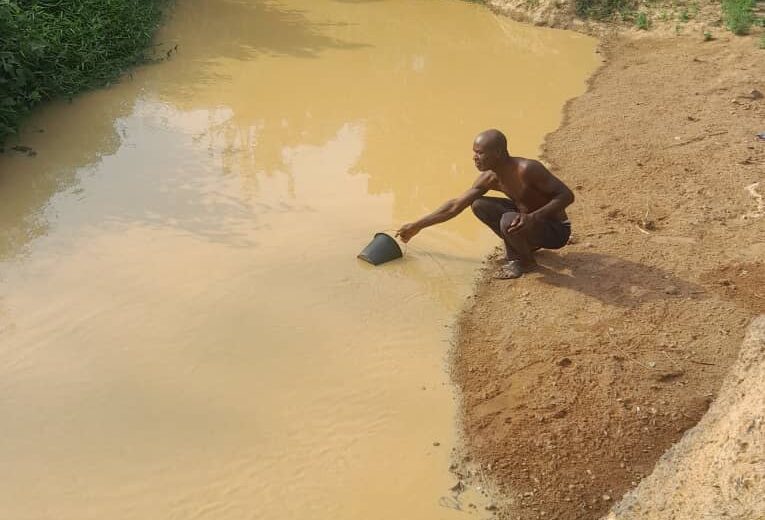
THIRSTY FOR CHANGE
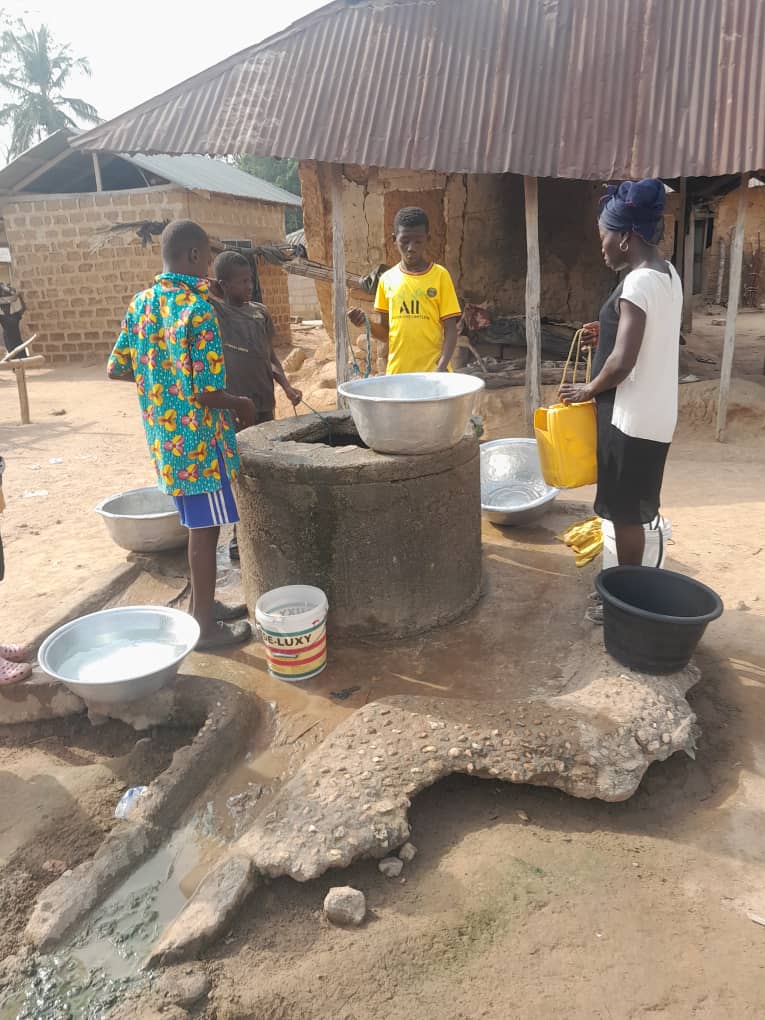
Alata residents have been struggling for potable water for years.
The inhabitants of Alata have suffered for years due to the lack of many social amenities, but safe, clean, potable water has been the most challenging issue, even after several efforts to correct this social injustice. However, the community, led by the traditional leader (Odikro) and elders, has finally set out to change this narrative themselves. They aim to accomplish this task by contributing both cash and communal labor to find a permanent solution to the unending water challenges that have persisted for centuries.
Safe and readily available water is important for public health, whether it is used for drinking, domestic purposes, food production, or recreational activities. Improved water supply and sanitation, along with better management of water resources, can enhance countries’ economic growth and significantly contribute to poverty reduction. Fresh water is essential for the survival of all living organisms on Earth.
Our bodies are comprised of about 60% water, and we cannot survive more than a few days without it.
A Visit to Alata Village
Alata is a village in the Bibiani Anhwiaso Bekwai District in the Western North Region of Ghana. The inhabitants’ desire to have access to fresh, potable water has been an illusion and a dream that, until the recent awakening, would not have been realized in their lifetime.
One bright morning in Alata village, the Odikro of the community called for an emergency general meeting. Elders, men, women, as well as learned residents, were all summoned to attend. From the expressions on the faces of the residents, it was evident that they were surprised and had no prior knowledge of this emergency meeting.
As a journalist and visitor, I was asked to sit in the meeting for observational purposes.
Not so long after all were seated, the Odikro, Nana Kwabena Tenakwa, joined in the meeting and made clear his statement and concerns. He spoke at length about development issues in the area and stressed the need to improve its water condition.
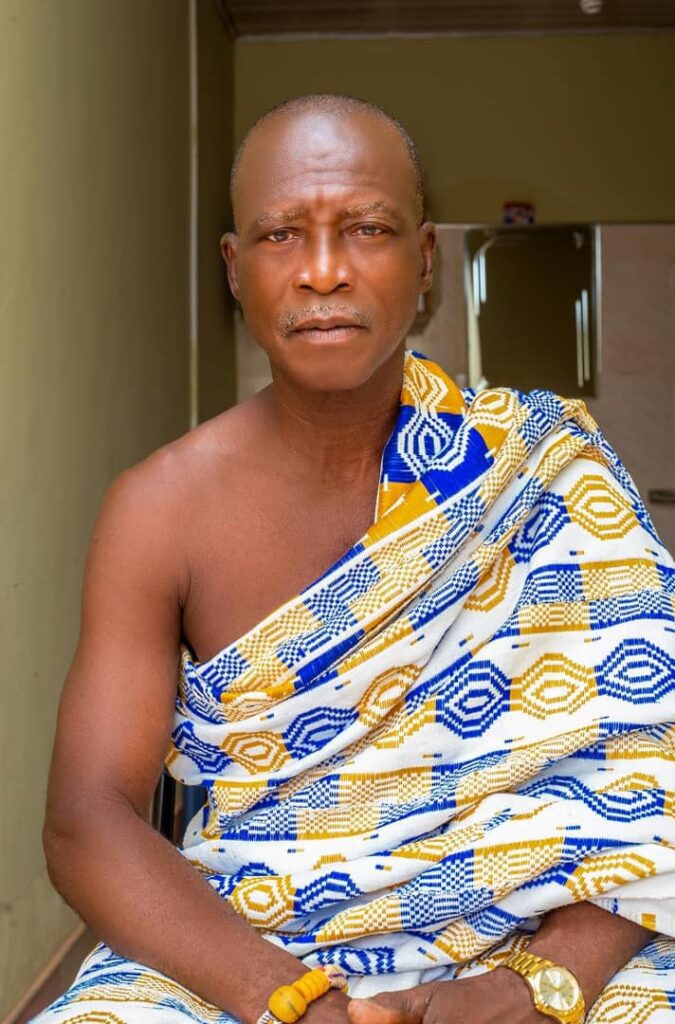
The Odikro of Alata is determined to address the water challenges in the community.
The State of Sanitation and Water Access:
In 2010, the UN General Assembly explicitly recognized the human right to water and sanitation. Everyone has the right to sufficient, continuous, safe, acceptable, physically accessible and affordable water for personal and domestic use. However, millions of people across the continent lack access to safe drinking water and basic sanitation services.
According to the World Health Organization (WHO) and UNICEF, approximately 319 million people in sub-Saharan Africa do not have access to basic drinking water services, while 695 million lack access to basic sanitation facilities.
The lack of access to clean water has significant implications for public health, particularly in rural and underserved communities. Waterborne diseases such as cholera, typhoid, and diarrhea are prevalent in areas with inadequate water and sanitation services, leading to illness, death, and economic hardship. Furthermore, the burden of collecting water falls disproportionately on women and girls, who often spend hours each day fetching water instead of attending school or engaging in income generating activities.
Local durbar at Alata village:
Nestled amidst the picturesque landscapes of Sefwi-Bekwai, Alata village is home to a vibrant community of hardworking individuals who rely on agriculture and livestock rearing for their livelihoods. Despite its natural beauty and rich cultural heritage, the village lacks access to clean water.
For generations, residents have grappled with limited access to clean water. The village, few years ago, relied on the only river in the community for its water supply. Unfortunately the river has been polluted by activities of illegal miners prompting the chief to call for a meeting to seek solutions. After the emergency community meeting, I drew closer to the Odikro of Alata, Nana Kwabena Tenakwa, to find out more about River Sulor and its rich history.
The Mystical River Sulor
The Odikro narrated that the Sulor has its source from the Bono region, meanders through the Ahafo region, then to the Samreboi community in the Western Region before finally joining the big River Ankobra in the Western North Region.
Attraction to the story led me to seek permission from the chief’s linguist to sit beside the chief, which was granted. Thrilled by my interest in the history, he continued “In the days of my ancestors, River Sulor was more than just a source of water; it was a central part of our identity. We would gather along its banks to fish, swim, and socialize, our lives depended on it.”
The traditional leader continued that “Children would splash and play in its cool embrace, while elders would cast their nets, harvesting the bounty that sustained our village for generations.”
Nana Kwabena Tenakwa however revealed that “the activities of illegal mining, also known as Galamsey, in neighboring communities including Wiawso and Juaboso has polluted the water.”
River Sulor has been polluted as a result of illegal mining.
The river was once teeming with life and vitality, now a neglected shadow of its former self. For too long, this once-thriving waterway has been overlooked, its health and significance disregarded. Despite its humble appearance, this neglected waterway harbors a rich textile of stories, traditions, and ecological wonders waiting to be discovered.
For as long as anyone in Alata can remember, Wednesdays have been revered as a day of rest for the gods, a time when they retreat from the affairs of mortals and seek solace in the calmness of their divine realm. It is believed that on this day, the gods have earned the right to uninterrupted repose, free from the commotion of earthly concerns.
And so, as the sun rises on Wednesday mornings, a solemn stillness descends upon the river, casting a spell of reverence upon all who behold its serene waters. The villagers speak in soft tones, mindful of the sacredness of the day, as they go about their daily tasks with a sense of reverence and respect.
No one crosses the river on Wednesdays—not for fishing, not for bathing, not for any reason at all. To do so would be to risk the wrath of the gods, who are said to take offense at any disturbance of their sacred rest. And so, River Sulor remains undisturbed, its waters untouched by the hands of mortals until the first light of Thursday breaks upon the horizon.
But while some may view this tradition as a superstition or an old wives’ tale to the villagers, it is a sacred custom that honors the ancient bond between humanity and divinity. It is a reminder of a testament to the enduring power of faith and reverence in the face of the unknown.
“Despite warnings by authorities to halt galamsey, the illegal activity persists,” the Odikro concluded.
Effects on Water Quality:
One of the most immediate and visible consequences of the illegal mining is the contamination of the Sulor river with toxic chemicals such as mercury and heavy metals.
These substances, used in the mining process to extract and process minerals, leak into waterways, polluting the water and endangering aquatic life. Elevated levels of mercury, in particular, pose serious health risks to communities that rely on these rivers for drinking water and fishing.
The Challenge of Clean Water Access:
The river is not the only source of water in the community; Alata village is privileged to have three additional boreholes.
The village relies primarily on these boreholes for its water supply. Unfortunately, the boreholes, which was constructed by some benevolent individuals some years ago is contaminated with filth and other particles.
A resident of the area, Kwabena Andrews, said “this community is a cocoa growing area with lots of prospects. In fact, we generate lots of revenue for the country. Unfortunately we have nothing to boast of. Not even clean and accessible water supply.”
Kwabena revealed that “when the borehole was constructed, it was as if a lifeline had been thrown to us. The anticipation and excitement were intense as the drilling began, with each passing day bringing us closer to the realization of a dream we had harbored for generations.” He continued that “We watched with bated breath as the drill bit delved deeper into the earth, inching towards the promise of clean, abundant water.”
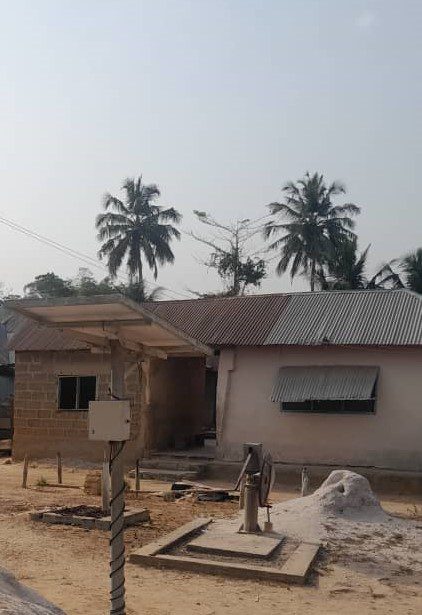
Residents trek miles for clean water because their mechanized borehole is contaminated.
Another resident, Naa Naakie emphasized that “when the first gush of water erupted from the borehole, it was met with jubilation and tears of joy. It seemed, for the first time in our recollection, that we finally had a dependable source of clean water within our village. I said to myself no longer will my friends and I trek for miles under the scorching sun to fetch water from other neighboring communities and worry about waterborne diseases ravaging our community.”
This dream would however be an illusion as the residents realized the borehole was contaminated with pollutants, posing serious health risks to the community.
“The realization that our borehole water was contaminated struck a deep chord within our community especially me as I felt betrayed by a source that I had trusted to sustain us, and my spirit was dampened by the knowledge that our access to clean water had been compromised.”
Naa Naakie continued that “I looked around me and could see the toll that this revelation has taken on my fellow villagers—the worry etched into their faces.”
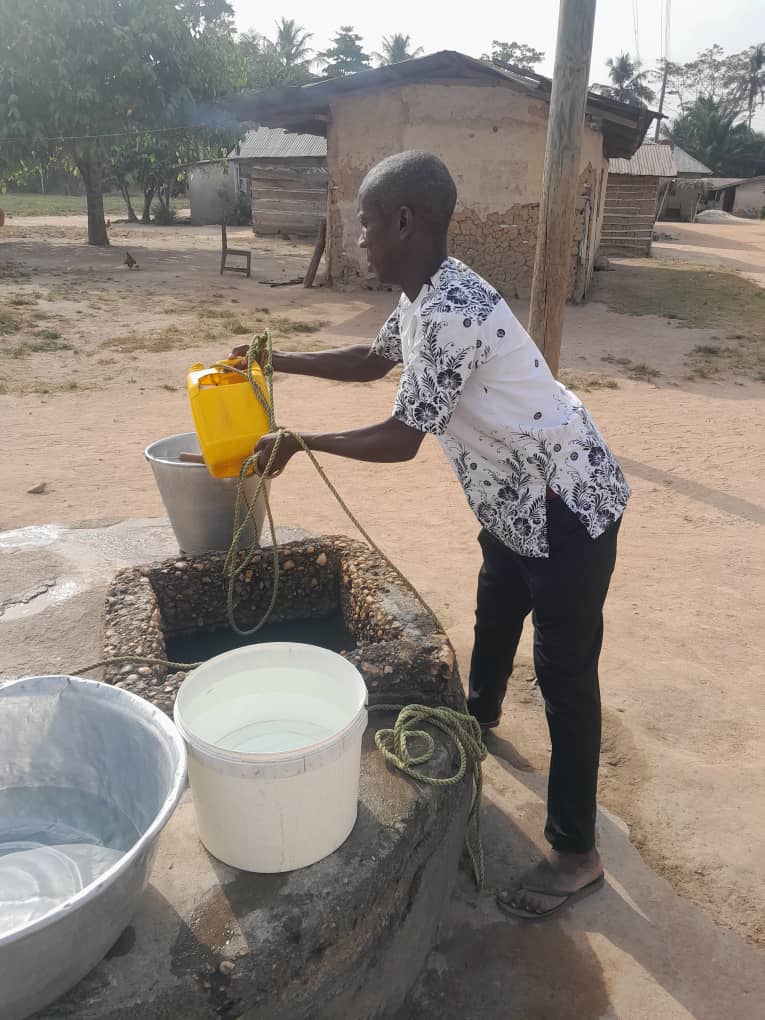
They have no option but to rely on this borehole for their daily activities.
Opportunity for transformation
But amidst the challenges lies an opportunity for transformation.
The Odikro narrates to me some plans he and his elders are undertaking to reclaim and revitalize the neglected river.
“I have promised to assist through grassroots initiatives, advocacy campaigns, and collaborative efforts.” The Odikro stressed
At the heart of the restoration efforts is a commitment to environmental stewardship and community engagement. These efforts not only improve the health of the river but also foster a sense of pride and connection to the natural environment.
Furthermore, the Odikro has taken steps to speak with the nearest water company in the area to connect the community for piped water supply—an effort the chief believes is far from achieving. Until then, residents of Alata have no option but to depend on their contaminated borehole and polluted river as their sources of water.
The way forward
Access to clean water is a fundamental human right that is essential for health, dignity, and development. In Alata village and countless other communities across Ghana, challenges of water access and quality is a major concern. By working together and prioritizing investments in water infrastructure and management, benevolent entities as Non-Governmental Organizations and individuals can build a future where clean water is accessible to all, transforming the lives of millions of people towards achieving the Sustainable Development Goal 6.3 which aims at improving water quality by reducing pollution, eliminating dumping, and minimizing the release of hazardous chemicals and materials into water bodies and build a brighter future for all.

Leave a Reply